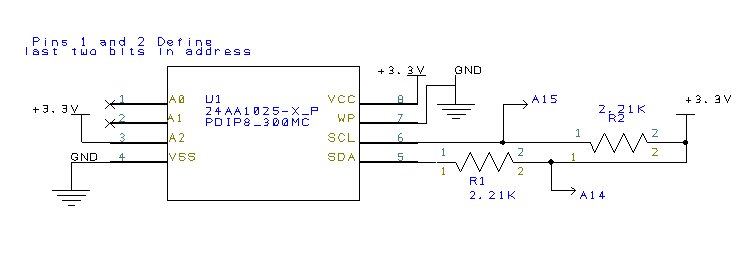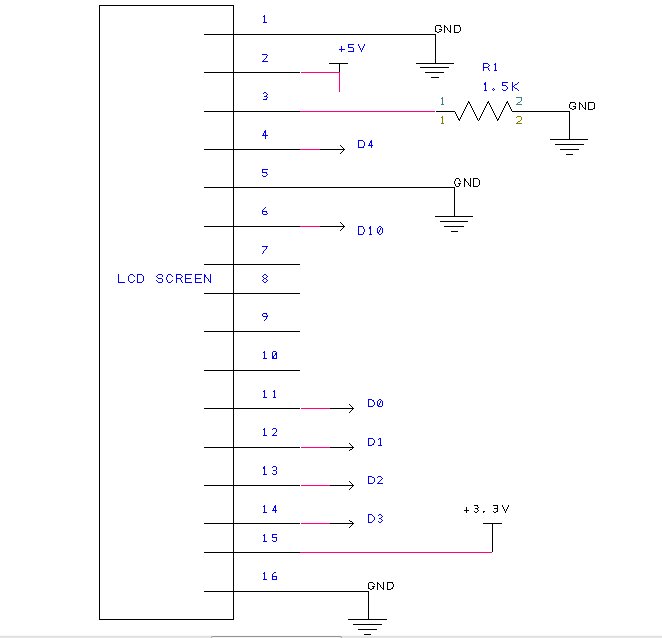Difference between revisions of "PIC32MX: I2C EEPROM"
MeganWelker (talk | contribs) (→Code) |
MeganWelker (talk | contribs) (→Code) |
||
| Line 24: | Line 24: | ||
== Code == |
== Code == |
||
/************************************************************** |
/************************************************************** |
||
* I2C EEPROM using LCD screen as output display |
* I2C EEPROM using LCD screen as output display |
||
* |
* |
||
| Line 30: | Line 30: | ||
/*Includes****************************************************/ |
/*Includes****************************************************/ |
||
#include <string.h> // used for string compare to verify data transmission |
#include <string.h> // used for string compare to verify data transmission |
||
#include <plib.h> |
#include <plib.h> |
||
#include <HardwareProfile.h> |
#include <HardwareProfile.h> |
||
#include <LCD.h> // used to display for debugging |
#include <LCD.h> // used to display for debugging |
||
#include <I2C_EEPROM.h> |
#include <I2C_EEPROM.h> |
||
/*Definitions*************************************************/ |
/*Definitions*************************************************/ |
||
#define BAUD_RATE 100000 |
#define BAUD_RATE 100000 |
||
#define BRG_VAL ((SYS_FREQ/2/BAUD_RATE)-2) |
#define BRG_VAL ((SYS_FREQ/2/BAUD_RATE)-2) |
||
/*Global Variables *******************************************/ |
/*Global Variables *******************************************/ |
||
unsigned char SlaveAddress = 0x50; |
unsigned char SlaveAddress = 0x50; |
||
short int addressCounter = 0x0000; |
short int addressCounter = 0x0000; |
||
/*Main Function***********************************************/ |
/*Main Function***********************************************/ |
||
int main(void) |
int main(void) |
||
{ |
|||
{ |
|||
char LCDbuffer[33]; // this will store the string for the LCD |
|||
//unsigned char test[28]="Hello world\nI2C is working!"; |
|||
unsigned char test[13]="Hello world!"; |
|||
int size = sizeof(test); |
|||
unsigned char readtest[size]; |
|||
//Initialize LCD |
|||
lcd_init(); |
|||
//Enable channel |
|||
OpenI2C1( I2C_EN, BRG_VAL ); |
|||
SlaveAddress = 0x50; //0b1010(B0)(A0)(A1) 24AA1025 EEPROM address |
|||
sendString(SlaveAddress, 0x0540, test, size); |
|||
receiveString(SlaveAddress, 0x0540, readtest, size); |
|||
//Print to LCD screen |
|||
if(strcmp(readtest, test)==0) sprintf(LCDbuffer, "\fTrue"); // make the string |
|||
else sprintf(LCDbuffer, "\fFalse"); |
|||
putsLCD(LCDbuffer); // write the contents of the variable |
|||
StopI2C1(); //Send the Stop condition |
|||
IdleI2C1(); //Wait to complete |
|||
CloseI2C1(); |
|||
while(1) |
|||
{} |
|||
{} |
|||
} |
|||
} |
|||
== Further Reading == |
== Further Reading == |
||
Revision as of 12:23, 14 February 2010
Original Assignment
Do not erase this section!
Your assignment is to interface to the I2C 24AA1025 EEPROM chip.
Overview
You can use the PIC32 to communicate with an EEPROM chip using I2C. The EEPROM chip can store data sent from the PIC and be retrieved at a later time (like an external hardrive).
To test that the code data was writing and reading correctly, the attached code sends data to the EEPROM through I2C, then from the EEPROM back to the PIC, and out to a LED display screen.
Circuit
Connection schematic for 24AA1025 Chip.
For visual feedback the PIC32 was connected to and LCD screen(1602A1 USB-A/Mini-B5-06):
Code
/**************************************************************
* I2C EEPROM using LCD screen as output display
*
**************************************************************/
/*Includes****************************************************/
#include <string.h> // used for string compare to verify data transmission
#include <plib.h>
#include <HardwareProfile.h>
#include <LCD.h> // used to display for debugging
#include <I2C_EEPROM.h>
/*Definitions*************************************************/
#define BAUD_RATE 100000
#define BRG_VAL ((SYS_FREQ/2/BAUD_RATE)-2)
/*Global Variables *******************************************/
unsigned char SlaveAddress = 0x50;
short int addressCounter = 0x0000;
/*Main Function***********************************************/
int main(void)
{
char LCDbuffer[33]; // this will store the string for the LCD //unsigned char test[28]="Hello world\nI2C is working!"; unsigned char test[13]="Hello world!"; int size = sizeof(test); unsigned char readtest[size];
//Initialize LCD lcd_init();
//Enable channel OpenI2C1( I2C_EN, BRG_VAL );
SlaveAddress = 0x50; //0b1010(B0)(A0)(A1) 24AA1025 EEPROM address
sendString(SlaveAddress, 0x0540, test, size);
receiveString(SlaveAddress, 0x0540, readtest, size);
//Print to LCD screen if(strcmp(readtest, test)==0) sprintf(LCDbuffer, "\fTrue"); // make the string else sprintf(LCDbuffer, "\fFalse"); putsLCD(LCDbuffer); // write the contents of the variable
StopI2C1(); //Send the Stop condition IdleI2C1(); //Wait to complete
CloseI2C1();
while(1) {}
}

